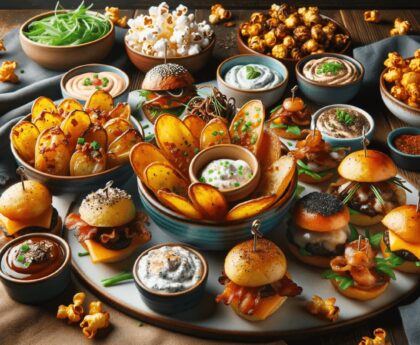Ah, chefs! They’re the maestros of the culinary world, creating symphonies on a plate that leave our taste buds dancing. But have you ever wondered how much these kitchen virtuosos are worth? Turns out, cooking isn’t just an art; it’s also a lucrative business for those who’ve got the right recipe for success.
Gordon Ramsay: A Fiery Fortune
First up on our list is none other than Gordon Ramsay, the man famous for turning culinary criticism into a sport. Love him or hate him, Ramsay has built a global empire worth an estimated $220 million. The guy’s got 35 restaurants, several Michelin stars, and a collection of TV shows under his belt. It’s like the culinary equivalent of owning an NBA team, isn’t it?
Jamie Oliver: The People’s Chef
Jamie Oliver’s down-to-earth approach to food has earned him both adoration and a net worth estimated at around $300 million. This British chef became a household name with his TV shows and cookbooks aimed at making cooking accessible to everyone. You know how some people just have that neighborly vibe? That’s Jamie for you, but with more cash.
Wolfgang Puck: The Austrian Wonder
Have you ever heard of Spago or Cut? If yes, then you’ve encountered the genius of Wolfgang Puck. This Austrian-born chef has a net worth of around $90 million. Imagine taking the precision of a Swiss watch and applying it to food. That’s Wolfgang Puck for you. His restaurants are a playground for the rich and famous, and why not? The man’s got talent worth its weight in gold!
Rachael Ray: Quick and Easy Does It
Quick! You’ve got 30 minutes to cook dinner; what do you do? If you’re Rachael Ray, you whip up something scrumptious and pocket a cool $80 million while you’re at it. She’s made a career out of practical, easy-to-follow recipes that resonate with everyday people. Ever felt like a clumsy elephant in the kitchen? Rachael Ray shows you it’s not that hard to turn into a graceful gazelle.
Ina Garten: The Barefoot Contessa
Ah, the queen of upscale comfort food, Ina Garten. She’s like that sophisticated aunt who knows how to throw an impeccable dinner party. With a net worth of $50 million, Garten shows us that simple, elegant food can also be good business. If her life were a cocktail, it would surely be a classic martini – elegant, timeless, and effortlessly classy.
Emeril Lagasse: Bam! That’s Money!
Emeril Lagasse is not just a chef; he’s a full-blown entertainer. With catchphrases like “Bam!” and “Kick it up a notch,” this American chef has cooked up a net worth of around $70 million. He’s the guy who can make a cooking show feel like a rock concert. If culinary arts had a Hall of Fame, he would certainly be in it, don’t you think?
So, What’s the Secret Sauce?
Is it Michelin stars, TV shows, cookbooks, or simply an innate ability to make our mouths water? Well, the truth is, it’s a bit of everything. These chefs have not only mastered the art of cooking but have also figured out how to serve it on a silver platter called “branding.” It’s like having the cake and eating it too, but in this case, the cake is worth millions!

Beyond the Kitchen: How Top Chefs Turn up the Heat on Their Earnings
We’ve talked about how popular chefs have garnered eye-popping net worth figures, but did you ever stop to wonder how they’re raking in the big bucks beyond their restaurant kitchens? It’s like asking what other instruments a guitarist knows how to play; it only adds layers to their talents and, in this case, their bank accounts.
Cookbooks and Recipe Guides
Starting with the most obvious, cookbooks are a gold mine for chefs looking to expand their reach. A well-received cookbook can sell millions of copies worldwide. Gordon Ramsay, for instance, has authored more than 20 cookbooks, adding a flavorful source of income. It’s like releasing a hit album, but for your taste buds!

Television Shows and Appearances
TV is where chefs like Jamie Oliver and Rachael Ray really cook up some extra dough. From cooking shows to competition series and even guest appearances on popular programs, these spots often come with hefty paychecks. Think of it as the Super Bowl ad of the culinary world; you make an appearance, and the cash register starts ringing.
Brand Endorsements and Product Lines
Ever tried a Rachel Ray non-stick pan or Emeril Lagasse’s branded cookware? These chefs often lend their name to kitchen products, spices, and even frozen foods. It’s akin to an athlete putting their name on a line of sneakers; it’s not just merchandise, it’s a statement of quality that fans are willing to pay for.
Cooking Schools and Online Courses
Some chefs, like Wolfgang Puck, have established cooking schools or offer online courses. Here, they’re not just selling food; they’re selling expertise. Imagine being able to dribble like LeBron or sing like Adele; that’s the allure of learning straight from the pros, and people pay top dollar for it.
Licensing and Franchising
When you reach a certain level of notoriety, even your name becomes a product. Chefs like Gordon Ramsay and Wolfgang Puck license their names to restaurants they don’t directly own. It’s like real estate, but instead of leasing land, they’re leasing their reputation.
YouTube and Social Media
In the digital age, platforms like YouTube offer an additional revenue stream. Ad revenue, sponsored posts, and collaborations can all contribute to a chef’s bottom line. It’s the modern version of a cooking show but with direct access to a global audience. It’s like having your own TV network at your fingertips.
Culinary Events and Speaking Engagements
When chefs get invited to culinary events, food festivals, or even corporate speaking engagements, they command a substantial fee. It’s the culinary equivalent of a concert tour, and the tickets are far from cheap!
In Summary
It turns out, the kitchen is just the starting point for these culinary artists. By diversifying their portfolios with multiple income streams from TV shows to cookbooks to endorsements and more – top chefs turn their culinary skills into thriving empires. Now that’s some food for thought, wouldn’t you agree?




